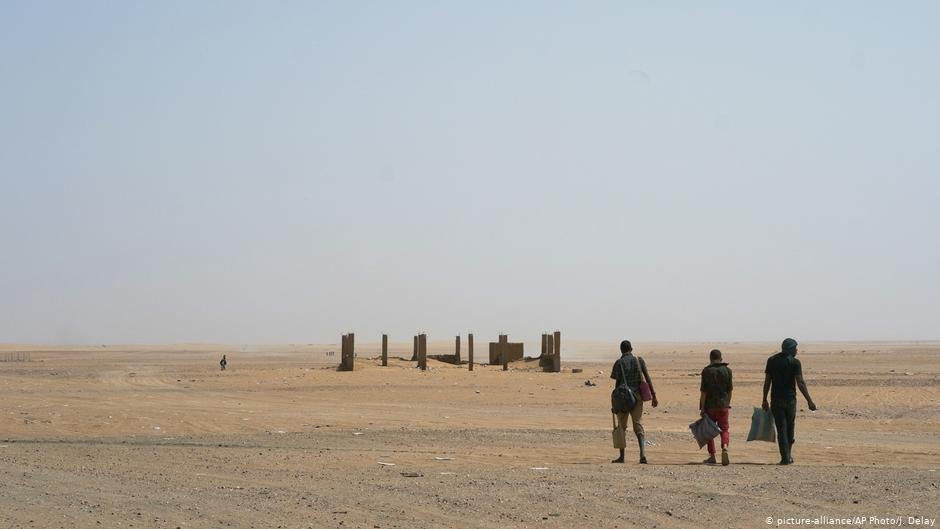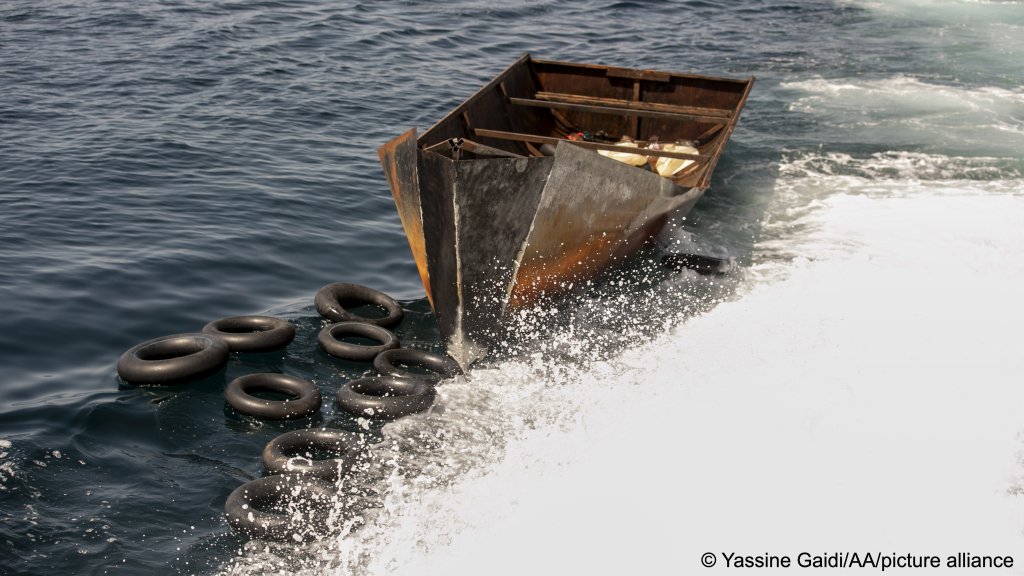Reports of a group of Sierra Leonian migrants who remain missing after being abandoned in the desert by Tunisian authorities are raising alarm among human rights groups. Survivor accounts reveal severe mistreatment. Meanwhile, six migrants have been found dead off the coast.
On September 12, the Qatar-funded broadcaster Al Jazeera published the story of a group of Sierra Leonean migrants who say they were abandoned in the desert by Tunisian authorities. Human rights groups reportedly told Al Jazeera they were becoming "increasingly concerned" about the welfare of a group of at least 29 migrants, originally from Sierra Leone, who remain "unaccounted for" somewhere in the border area between Tunisia and Algeria.
A few days before Al Jazeera, InfoMigrants French also spoke to a member of the same group, a 24-year-old man they named as John.*
In video footage shot by John, the French team explain that the group had been abandoned in the desert with very little food or water. They showed how some members of the group resorted to licking their own skin to try and obtain salt and water to carry on.
One of the pregnant women, exhausted from walking so far, temporarily removed her clothes to try and cool off and one of the babies fell asleep on the dusty ground alongside a parent. One of the pregnant women, explained the team, is John's wife.
Abandoned at the end of August
According to Al Jazeera, the group of 29 was originally part of a group of 42 Sierra Leonean asylum seekers and migrants who were abandoned along with nearly 100 other migrants by Tunisia’s National Guard at the end of August. Many of the group were later rescued by Human Rights Groups a few days after their abandonment.
One of the group, a 24-year-old Sierra Leonean named as Anderson, said he was abandoned for 12 days in the desert before being rescued. For more than a year now, human rights groups and journalists have been documenting the practice of pushing migrants in Tunisia to the country’s desert borders, in stark violation of international humanitarian law.
Also read: 40 migrants allegedly expelled to desert by Tunisia

Anderson's story
Testimonies from migrants like Anderson allege that the migrants are often beaten before being abandoned with no money, water, and sometimes without mobile phones or food.
It is difficult to estimate the numbers of migrants currently in Tunisia, since many are there without being registered by official bodies. However, the UN Refugee Agency UNHCR has registered around 16,500 asylum seekers.
The UN Migration Agency IOM, which is also present in the country, estimates that almost as many, if not more, could be present in the country with no official status. In April for instance, they estimated that as many as 15,000 migrants might be present at one single camp outside the port city of Sfax, a popular departure point for migrants hoping to cross the Mediterranean towards Europe.
Anderson told Al Jazeera that he was arrested on August 15, while traveling from Sfax towards Tunis to renew his UNHCR asylum seeker status. He told the broadcaster that after being stopped he was beaten "like a thief" and suffered his hands being tied behind his back. Along with around 130 other migrants, Anderson said he was driven towards Tunisia’s southern border and deposited near the Algerian frontier in a place called Umm al-Arais.
'Several infants and three pregnant women'
Anderson told Al Jazeera that in his group of Sierra Leoneans, there were "several infants and three pregnant women" including one heavily pregnant woman and her partner. The broadcaster posted a redacted photo of Anderson’s UNHCR asylum seeker card, saying Tunisian authorities had ignored his official status in the country.
At least 13 people in the group of 42 "fell behind" after four days in the desert. Anderson says he doesn’t know what happened to those people, which included 11 men, and two girls. "I still can’t sleep, I dream of them, but there was nothing anyone could do. We had nothing. We had no power. What could we do?" he asks, while recounting his story.
Anderson is perhaps among the lucky ones. He says he managed to hide his mobile phone from the guards, and so was able to make a call and initiate a rescue. A German friend visiting Tunis reportedly contacted him and then mobilized the group Refugees in Libya to try and rescue them.
Also read: Migration trends, declines in arrivals to Italy and rise on the Canary Islands
'Deaths of migrants increasing' in Tunisia
However, a spokesperson for Refugees in Libya, Mahamat Daoud Abderassoul, told Al Jazeera that efforts to locate the remainder of the group have remained fruitless, despite underlining that they continue to try.
Abderassoul, who is now based in Rome, said that his group "regularly receive hotline messages from refugees across North Africa," but underlined that the "situation in Tunisia is going from bad to worse."
The group said that "the deaths of migrants [in Tunisia] are increasing, especially in the last months."
IOM said that several members of Anderson’s group had been transferred to IOM shelters in Medenine and Tataouine.
Also read: Nine arrested in Tunisia for allegedly helping migrants come to Europe
'Systematic' practice of expulsions
Another Human Rights Group, Human Rights Watch, told Al Jazeera that they believed since last summer when reports of expulsions of migrants in Tunisia began, the practice had become "systematic." Salsabil Chellali told Al Jazeera, "it’s become a well-oiled machine, with authorities better organized to carry out these unlawful expulsions." She admitted though that it was difficult to assess how extensive the expulsions might be.
Chellali told Al Jazeera that an increasingly repressive climate in Tunisia was "exacerbating matters." She said that the government had made "giving aid to asylum seekers…illegal, [and] even contacting refugees and irregular migrants could be criminalized."
Al Jazeera said that neither the EU or the Tunisian authorities had responded to requests about Anderson’s account of what happened to his group in the desert. However, 12 days after their rescue, reports the broadcaster, the heavily pregnant woman in the group gave birth to a boy. They named him Alhajie Anderson, reported Al Jazeera, "after the man whose phone summoned help" for the group.

Six migrants, including child found dead in sea
Meanwhile, Tunisian coast guards said on Thursday (September 12) they recovered the bodies of six female migrants, including a baby, off the coast of Monastir, reported the news agency Reuters.
The group of migrants was recovered from the sea late on Wednesday, a Tunisian judge told Reuters. Those who died reportedly hailed originally from sub-Saharan African countries.
Also read: One dead, 22 missing as boat capsizes off Libya
Upcoming elections
Tunisia is currently preparing for a presidential election, due in October. Some international election observation groups have already said they fear the election might not be free or fair.
On Monday this week, it was announced that election officials in Tunisia had "doubled down on its decision to deny accreditation to some election observer groups," reported the news agency Associated Press (AP).
Tunisian officials accused the groups they denied accreditation to of receiving "huge amounts" of foreign funding, deeming that funding of "a suspicious origin." Two of the civil society groups reportedly denied accreditation are also known for their work on human rights and support of migrants. However, government officials have so far failed to name which groups exactly they have denied funding, reported AP.
With Reuters and AP
Also read: UN discovers mass graves of migrants along Libya-Tunisia border
*John is not his real name, but has been changed to protect his identity
